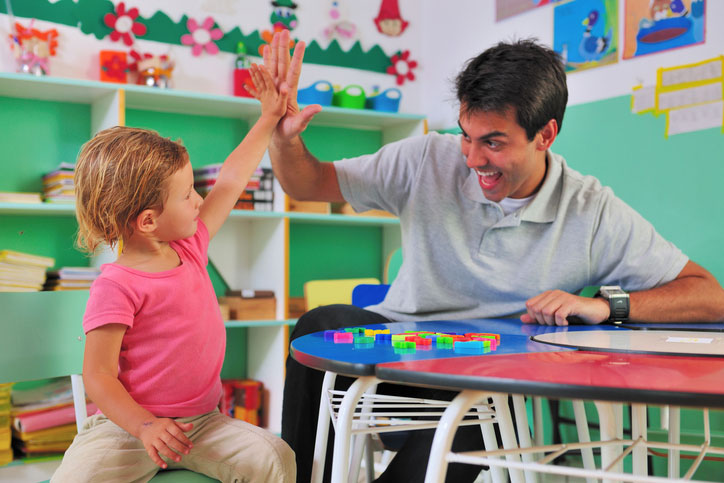Reviewed by Mary McLaughlin, M.S. SpEd
At its best, the parent-teacher relationship is rewarding, positive, and mutually beneficial for students, parents, and teachers. At its worse, it’s frustrating, ineffective, and detrimental to student success.
The parent-teacher relationship can be the difference for kids struggling with socialization or showing signs of learning delays, so it’s vitally important that preschool teachers and parents work in partnership with one another. Remember that your preschoolers aren’t the only ones new to a formal education environment. For many parents, preschool is new to them, too—at least as parents. This means that your job is often just as much about educating the parents as it is about educating the kids in your classroom.
Here’s how to navigate the parent-teacher relationship, so that parents feel appreciated and heard…you feel respected and valued…and the kids reap the rewards.
1 -Ditch the progress reports and take the time for meaningful conversations
Sometimes, problems with the parent-teacher relationship occur because parents don’t feel as if they are being kept in the loop about their child’s progress. A report with checkmarks next to the categories in which their child is making progress or meeting milestones may give them black and white answers, but it doesn’t do much for making them feel like they’re part of the process.
You can make significant strides in this area by simply engaging in meaningful conversations about their child. It doesn’t have to be frequent (after all, you only have so much time), but taking the time to talk to parents a couple times throughout the school year can go a long way in making them feel like you’re in touch with their child and committed to maintaining a strong parent-teacher relationship.
Also, consider reaching out to parents with words of encouragement, not just criticism. While you’ll always need to contact parents to discuss concerns, taking the time to make a quick phone call or send an email with good news is one of the best ways to establish a friendly rapport with parents and to let them know you’re paying attention and noticing good behavior and performance.
2 – Let parents know the important role they play in their child’s education
Remember that many parents of preschoolers have never done this before, so don’t assume they know what role they play in their child’s education.
Ask them about their thoughts and concerns, and leave them with plenty of ideas about what they can do at home to help ensure their child’s success. Educate them on how your program works, what you hope to accomplish with their kids, and the important role they play in their child’s success.
Doing so will not only make parents feel involved and valued, but it will also help you set boundaries. For example, they can request a meeting, but they cannot expect you to engage in impromptu conversation about their child during school hours. Let overbearing parents know that being a successful partner in their child’s education means that they must appreciate that you have a classroom full of students who also need an equal amount of attention.
Also, keep in mind that parents can provide you with valuable insight on their children, which can help you better encourage, support, and motivate them. Remind them that you’re working together as a team and that their involvement in their kid’s education benefits everyone.
3 – Give parents an opportunity to participate in the classroom experience.
Some preschools operate as cooperative environments, where parents are assigned classroom tasks and take turns working in the classroom. This model works very well for many schools, as it allows parents to become active participants in their child’s preschool experience.
But even if your preschool classroom operates in a more traditional fashion, you can still satisfy parents’ desire to participate by giving them opportunities to become involved. Preschool parties are a great way to get parents involved, as are field trips and other activities outside the classroom. You may also implement parent or family visitation days a few times a year to further nurture positive relationships with parents.
Allowing parents to participate is also beneficial to you as an educator, as it will likely give them a newfound appreciation for all your hard work.
4 – Use a newsletter to keep all your kids’ parents up-to-date on what’s happening in the classroom.
Timely updates are a great way to keep parents in the loop about what your kids are learning. A weekly or monthly newsletter, either printed or emailed, can include everything from important reminders to fieldtrip details to what you’ll be covering in your upcoming lessons. It’s also a great place to give public recognition to student successes and achievements. Just be sure to give every kid recognition at some point so no one feels left out. Your students’ parents will appreciate the effort, and you’ll have a convenient method of keeping everyone current on what’s going on so that all parents are on the same page.




